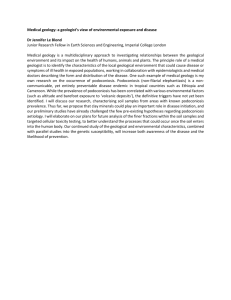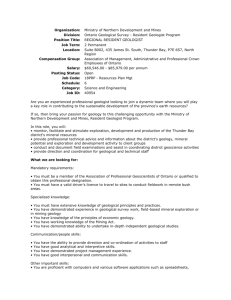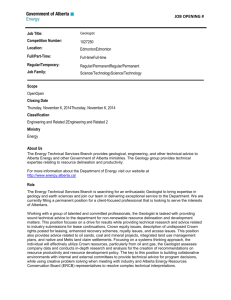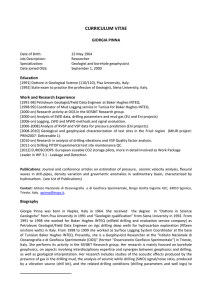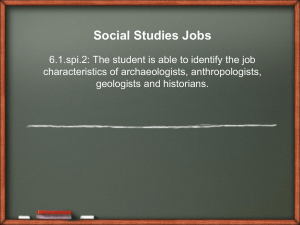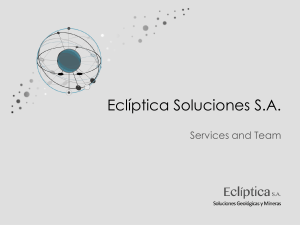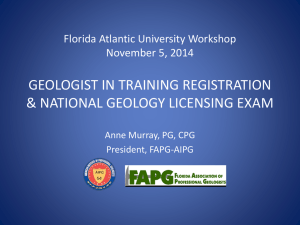FGDP Info Packet - UW Earth & Space Sciences
advertisement
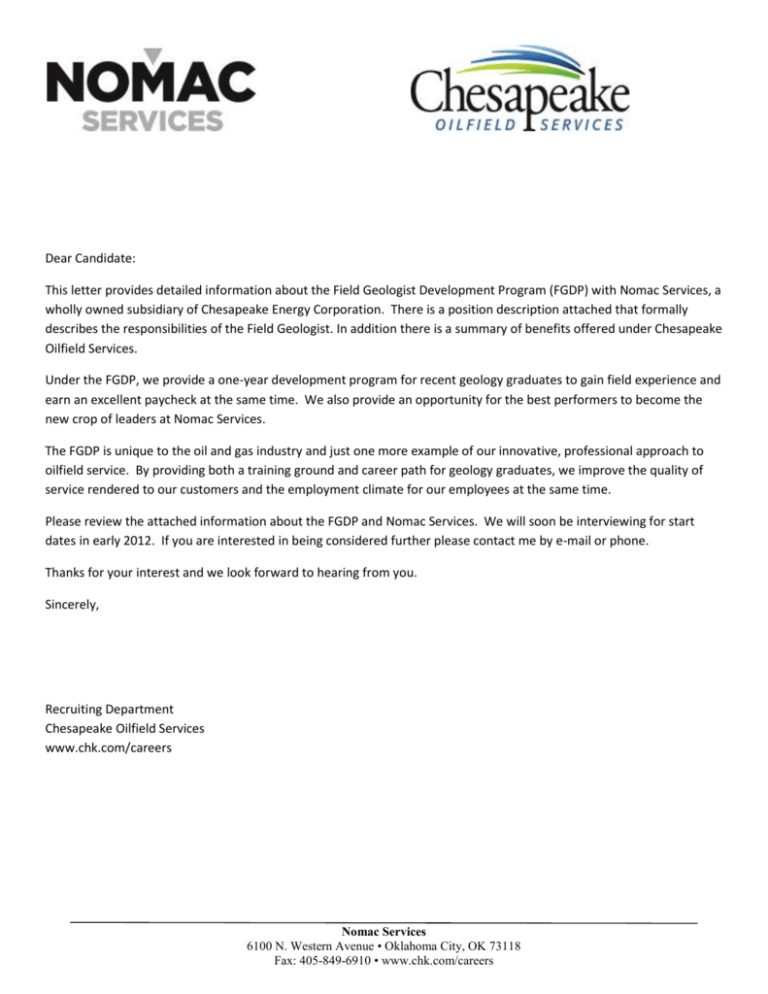
Dear Candidate: This letter provides detailed information about the Field Geologist Development Program (FGDP) with Nomac Services, a wholly owned subsidiary of Chesapeake Energy Corporation. There is a position description attached that formally describes the responsibilities of the Field Geologist. In addition there is a summary of benefits offered under Chesapeake Oilfield Services. Under the FGDP, we provide a one-year development program for recent geology graduates to gain field experience and earn an excellent paycheck at the same time. We also provide an opportunity for the best performers to become the new crop of leaders at Nomac Services. The FGDP is unique to the oil and gas industry and just one more example of our innovative, professional approach to oilfield service. By providing both a training ground and career path for geology graduates, we improve the quality of service rendered to our customers and the employment climate for our employees at the same time. Please review the attached information about the FGDP and Nomac Services. We will soon be interviewing for start dates in early 2012. If you are interested in being considered further please contact me by e-mail or phone. Thanks for your interest and we look forward to hearing from you. Sincerely, Recruiting Department Chesapeake Oilfield Services www.chk.com/careers Nomac Services 6100 N. Western Avenue • Oklahoma City, OK 73118 Fax: 405-849-6910 • www.chk.com/careers The Field Geologist Development Program The Field Geology Development Program is designed to develop recent geology graduates in field positions, allowing them to build their skills and experience while contributing profitably and quality service to the company. As participants develop under the program, we increase their responsibility and provide training in other areas, such as geosteering and field supervision. Not only do they become first-class field geologists, they also position themselves for a long-term career path with Nomac Services. As participants near the end of their one year program, they begin to target a career path. In addition to field geology positions within the company, they can also choose a career path that includes field supervision as well as staff and management positions. The program is comprised of three phases: Phase I (Field Geologist Trainee I) Introduction - The FGDP begins with a two-week intensive Training Phase in which geologists learn Nomac Services’ processes, procedures and company culture. The trainee learns about safety, drilling, communication, quality, software and equipment—everything necessary to be a productive Field Geologist. It is a rigorous training program that builds the basic skills they need in the field and camaraderie with other program participants. Initial Field Phase - Following the two-week training phase, participants work in the operation as Field Geologist Trainee I for approximately four months to put their training into practice. During this time they not only gain experience in operating Nomac Services production and quality processes but begin to develop ideas for improving or expanding the company’s products, services and training. Training objectives and milestones will be used to assess the competency of the Field Geologist and determine the readiness for advancement in the program. Phase II (Field Geologist Trainee II) Classroom Review - Upon completion of Initial Field Phase, participants return to the classroom for a one-week Interactive Phase of training, discussion and quality improvement. Each participant’s quality records for the Initial Field Phase are reviewed, along with any training/process improvement suggestions they developed in their time in the field. Participants also study advanced courses and begin to learn how various staff functions at NOMAC Services. The goal of this phase is to improve both the participant’s skills and the company’s ability to deliver exceptional service. Intermediate Field Phase - Participants proceed to an Intermediate Field Phase where they continue to practice and improve their skills as well as begin to mentor other Trainees in areas of geology, communication and quality. As part of this phase, participants also develop their own specialized geology training course or problem/solution project for other employees based upon their specific experience. Field Geologist Trainee II will also return to the operations center at some point during this phase to complete a two-week rotation in Quality Control. Training objectives and milestones will be used to assess the competency of the Field Geologist and determine the readiness for advancement in the program. Phase III (Field Geologist Trainee III) Classroom Review – Upon completion of the Intermediate Field Phase, participants return to the classroom for a one-week Interactive Phase of training specifically targeting Geosteering. Participants will be trained on the theories, procedures, and applications of the geosteering process. Each participant will work with specific software and practice correlating data sets, perform mathematical calculations, generate reports, and steer Nomac Services 6100 N. Western Avenue • Oklahoma City, OK 73118 Fax: 405-849-6910 • www.chk.com/careers “mock” wells. The goal of this phase is to improve the participant’s knowledge of geosteering and give them the skills necessary to advance to the next stage. Advanced Field Phase – Participants proceed to an Advanced Field Phase to continue the with field experience. Field Geologist in this phase will assume more of a leadership role in the teams and participate in advance techniques. Field Geologist Trainee III will also return to the Geosteering Operation Center (GOC) for a twoweek rotation in geosteering operations. This is designed to determine the ability and skill of the participants. Training objectives and milestones will be used to assess the competency of the Field Geologist and determine the readiness for advancement in other opportunities. General Employment Information Compensation – the FGDP is designed to provide gradual increases as ability and performance improve. Along with the outstanding benefits all Chesapeake employees receive, the compensation is as follows: Phase I – Field Geologist Trainee I pay structure (bi-weekly) is based on a yearly salary of $57,500. Phase II – Field Geologist Trainee II pay structure (bi-weekly) is based on a yearly salary of $61,000. Phase III – Field Geologist Trainee III pay structure (bi-weekly) is based on a yearly salary of $64,000. Location – You may be assigned to any of our four divisions: Northeast (PA, WV, OH, and NY); Mid-Continent (OK, North TX, AR, LA and KS); Texas (South and West TX); or Rockies (WY, CO, ND, SD, MT and NE). Nomac’s policy is to assign field geologist where needed and to move field geologist as necessary to advance their career and meet company requirements. Services and Work Schedule – Most work is two-person, 24 hour-a-day service on nearly all wells. Some work is a one-person service, in which the field geologist is onsite part of the day but does not render 24-hour service. Field Geologist work a 12-hour shift for 16 days, and then have 5 days off. While on shift, the field geologist is required to be at the well site, awake and working during their shift. Occasionally, they may be released from the well site by the Supervisor during casing breaks, bit trips or other periods when there is no drilling. Both types of service have highly variable schedules that vary by season, rig and location. Work and living quarters – The company provides a trailer with sleeping/living quarters for field geologist to use at the site when not on shift. Depending on the assigned location, other housing options may be available for a base of operations when they are not required to be at the well site. All company housing is shared, only company employees are allowed to use the facilities. Mobilization and Travel – Travel expenses for FGDP participants to attend training sessions are paid by the company. Travel expenses (gas, food and lodging) to reach the first assignment are reimbursed after proper submission. Travel expenses after initial reporting to the assigned location are borne by the employee. Health and Safety – All employees are expected to work in a safe and professional manner at all times. All safety gear required is provided with the exception of safety shoes (steel-toed boots) and prescription safety glasses, which are available for a nominal cost at home supply, discount or department stores such as Home Depot, Lowes, and Wal-Mart or online at retailers such as www.zappos.com. Nomac Services 6100 N. Western Avenue • Oklahoma City, OK 73118 Fax: 405-849-6910 • www.chk.com/careers Our Company Nomac Services is a wholly owned subsidiary of Chesapeake Energy Corporation. Nomac Services focus is to provide exceptional field geology and geosteering services to maximize the discovery and productivity of natural gas and oil operations. Chesapeake is the second-largest producer of natural gas, a Top 15 producer of oil and natural gas liquids and the most active driller of new wells in the U.S. Chesapeake owns leading positions in the Barnett, Haynesville, Bossier, Marcellus and Pearsall natural gas shale plays and in the Granite Wash, Cleveland, Tonkawa, Mississippi Lime, Bone Springs, Avalon, Wolfcamp, Wolfberry, Eagle Ford, Niobrara, Three Forks/Bakken and Utica unconventional liquids plays. Chesapeake’s focus on vertical integration offers a unique opportunity to service all the operations from the wellsite with service companies such as Great Plains Oilfield Rental, Nomac Drilling, Nomac Services and Performance Technologies. Field Geology What is field geology? Before the FGDP, there was no such thing as field geology. The service was known as “mud logging”. Nomac Services changed the industry by providing educated, young professionals a chance to gain operational experience in the field. Science based college graduates have the opportunity to build a foundation of experience that will provide them the skills necessary to be a successful Geologist in the oil and gas industry. Field geology is an oilfield service that is rendered during drilling. Drilling an oil or gas well is accomplished by using a special drilling bit to grind a hole through rock. The drill bit is on the bottom of a long string of pipe that is used to turn the bit. A special lubricant, known as drilling mud, is forced down through the pipe and allowed to flow back up the sides of the hole. The drilling mud washes the ground up bits of rock out of the hole so that the drill bit is constantly in contact with new rock. The mud flows over a series of filters to remove the bits of rock so that the mud can be reused. Nomac Services 6100 N. Western Avenue • Oklahoma City, OK 73118 Fax: 405-849-6910 • www.chk.com/careers Example Mud Log Drilling Depth based on measured depth Lithology the type and thickness of each rock Rate of Penetration Curve for the drill bit in minutes per foot Sample Descriptions the content and characteristics of the rock layer Gas Curves showing quantity and type of gas encountered during drilling Nomac Services 6100 N. Western Avenue • Oklahoma City, OK 73118 Fax: 405-849-6910 • www.chk.com/careers Field geologists have three primary responsibilities during the drilling process: First, field geologist are responsible for physically inspecting and reporting on the rock cuttings, known as rock “samples,” that are removed from the hole by the drilling mud. Roughnecks on the rig collect and bag the rock samples periodically based upon instructions from the drilling geologist (typically, every 10 or 30 feet). Field geologists receive the rock samples, clean and organize them, and analyze them under a microscope. Using the samples, they make a map of the rock formation layers through which the well is drilled and describe the characteristics found in each rock layer. Second, field geologists are responsible for analyzing and plotting the natural gas that is released from the rock during drilling. As the bit cuts through the rock layers, natural gas under pressure is released into the drilling mud. Using sophisticated tools and computer analysis, geologists plot the rate of drill bit penetration and associated natural gas characteristics for each foot of drilling depth. Finally, field geologists are responsible for communicating with the exploration geologist. They act as the exploration geologist’s “eyes and ears” at the drill site, discussing the various events that occur during drilling with other well site personnel and reporting those events to geologists in the exploration office. It is critical for field geologists to develop a rapport and relationship with other well site personnel in order to gather and report drilling information. Each day, and at the conclusion of the well, the mud log is sent to the geologist and a variety of other interested parties to document the conditions present during drilling, the events that occurred, and the content and characteristics of the rock layers that were penetrated. What is a typical day for a field geologist? In the oilfield, drilling is a 24x7x365 operation. Exploration geologists typically turn in a report for all their wells in the early morning, so a field geologist’s day starts early enough to ensure that exploration geologist has the information they need to prepare their report. A typical day might start at approximately 2 – 4 a.m., depending upon the daily report time specified by the geologist. The field geologist collects, analyzes and describes the samples gathered since the last report, discusses drilling events with the personnel at the site, prepares the mud log, produces a morning report, and reviews the information with the Nomac Services Quality Control department — all in time to get the report to the geologist somewhere between 5 – 7 a.m. After submitting the report, the field geologist prepares everything for the next day’s cycle by organizing and storing samples, maintaining equipment, cleaning the trailer, meeting with well site personnel, and planning the next 24 hours with the Field Supervisor. Occasionally throughout the day, the field geologist checks equipment performance (using the Internet) and, if required, provides updates of drilling events to the exploration geologist and wellsite personnel. What is a typical work environment? Oil wells are drilled almost exclusively in relatively remote rural areas. The typical well is located in an open field and is accessed by taking a dirt or gravel road that was built especially for drilling the well. There is no “office work” for a field geologist — everything happens at the well site. Field Geologist communicates with Field Supervisors, exploration geologists and other company personnel using company-provided laptop or desktop computers, email and cell phones. Nomac Services has trailers that are moved to the location and “rigged up” by supervisors or dedicated field support personnel. Field geologists are expected to support this process by running lines, setting up equipment and checking all equipment at the time of rig up to ensure it is working properly, then reviewing equipment performance each day and reporting problems to operations personnel. Nomac Services 6100 N. Western Avenue • Oklahoma City, OK 73118 Fax: 405-849-6910 • www.chk.com/careers What are the traits of a good field geologist? Dedication – a good field geologist is dedicated to doing their job right the first time, keeping the customer happy and continually improving upon their performance. Nomac Services will provide extensive training and guidance, but a good field geologist must have an internal drive for personal and professional success and growth. The hours are long and the conditions can be difficult at times; one must be willing to do the hard things to build the experience needed to have a successful career in the oil and gas industry. Computer Aptitude – if you cannot perform basic computer tasks, you will not be successful as a field geologist. Specifically, you must be able to use email and Microsoft office applications, including Microsoft Excel. You must have basic knowledge of computer systems and how they communicate to other systems. You must have a basic mechanical aptitude for working with small hand tools. These are simple but critical applications. Discipline – field geologists affords a significant amount of independence and autonomy. You must be able to provide your own structure, motivate yourself to complete everything on time in accordance with the quality standards, and continually learn to improve upon your own performance. There are no babysitters in the oilfield – success is up to you. Nomac Services 6100 N. Western Avenue • Oklahoma City, OK 73118 Fax: 405-849-6910 • www.chk.com/careers Nomac Services, LLC Position Description Position: Field Geologist Trainee Reports to: Field Supervisor Supervises: None Classification: Exempt Schedule: The work schedule is variable because it is based upon the number of wells underway, the drilling cycle involved in each well and the problems that are encountered along the way. Overview: This position is responsible for performing daily field operations in accordance with the Company’s approved operating processes and in a manner that ensures customer satisfaction. The Field Geologist Trainee performs mud logging, which is the Company’s primary service for customers, and assists in other field operations. The Field Geologist Trainee is responsible for the quality, timeliness and accuracy of his/her work product. Requirements: 1. 2. 3. Bachelor’s or advanced degree in geology, earth science, geosciences or environmental science; OR Bachelor’s degree in engineering, chemistry or life science and demonstrated success in initial training class; Two or more years of professional experience as a logger and demonstrated success in initial training class. Roles Employee (primary) Field Employee (primary) Mud Logger (primary) Field Support (secondary) Duties: Perform work processes in accordance with the Company’s approved operating processes and in a manner that ensures customer satisfaction. Processes performed are: 1. 2. 3. 4. 5. 6. Field Geology a) Collecting, preparing, analyzing and describing samples; b) Preparing and delivering the mud log and status report; c) Reviewing equipment status, troubleshooting and repairing equipment, and reporting problems; d) Monitoring and maintaining supplies and work environment. Field Support – assist in trailer rig up/rig down. Safety – work and drive safely. Communication – communicate properly with Company personnel, customers and other external parties. Administration a) File work records and expenses in an accurate, timely manner; b) Review pay information prior to payroll dates. c) Review information on the Company web site. Other functions as assigned by the Field Supervisor or other company management. Nomac Services 6100 N. Western Avenue • Oklahoma City, OK 73118 Fax: 405-849-6910 • www.chk.com/careers
